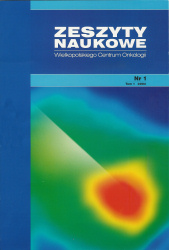Abstract
Celem niniejszej pracy jest podsumowanie doniesień na temat roli fizyka medycznego w zastosowaniu sztucznej inteligencji i automatyzacji planowania leczenia na podstawie prezentacji ustnych, wykładów oraz sympozjów przedstawionych podczas 39. konferencji Europejskiego Towarzystwa Radioterapii i Onkologii - ESTRO (ang. European SocieTy for Radiation and Oncology).
References
L. Rossi, Where can automation help or cannot help the medical physicist, materiały zjazdowe konferencji ESTRO 39, online congress, 28.11–01.12.2020;
B. Heijmen, Do's and dont's in automated treatment planning – optimising conditions and expectations, materiały zjazdowe konferencji ESTRO 39, online congress, 28.11–01.12.2020;
K. Kiers, Artificial intelligence and automation: Treatment planning without user interaction – automatic plan approval of prostate auto-plans, materiały zjazdowe konferencji ESTRO 39, online congress, 28.11–01.12.2020;
W. Van Eempt, ESTRO-AAPM: The future of Medical Physics in Radiation Oncology: Medical physicists will drive the development and implementation of artificial intelligence in Radiation Oncology, materiały zjazdowe konferencji ESTRO 39, online congress, 28.11–01.12.2020;
C. Clark, ESTRO-AAPM: The future of Medical Physics in Radiation Oncology: Medical physicists will be leaders in the changing world of radiation oncology, materiały zjazdowe konferencji ESTRO 39, online congress, 28.11–01.12.2020;
A. Green, Validation and comissioning of AI contouring tools, materiały zjazdowe konferencji ESTRO 39, online congress, 28.11–01.12.2020;

This work is licensed under a Creative Commons Attribution-NoDerivatives 4.0 International License.
Copyright (c) 2021 Letters in Oncology Science
